WHEAT GROWERS EYE GMO
CHALLENGES KANSAS CITY, Mo., Feb 16 (Reuters) – US wheat growers face an expensive uphill journey as they follow in the controversial footsteps of soybean and corn farmers toward producing and marketing genetically enhanced crops, grain industry players said on Wednesday. Wheat is a genetically complex plant and thus has lagged biotech advancements seen in
corn, soybeans, cotton and rice, according to wheat breeders. But within three to five
years, biotech wheat will be introduced to the market as agricultural companies race to
bring an herbicide-tolerant offering to the market, wheat experts said at a forum on
genetically modified organisms at the US Wheat Quality Council annual meeting in Kansas
City. "RoundUp Ready wheat is probably going to be the first one to hit the market," said Monsanto Co agricultural consultant John Richardson, referring to wheat designed to withstand Monsanto’s RoundUp herbicide. "In 2003 it will come out in Canada and in the US spring wheat. Winter wheat will be further behind." With research advancing in genetically modified wheat, the industry must start to address issues of legal liability, identity preservation expenses, international approval and consumer acceptance at home and abroad, agricultural experts said. "There are some exciting things coming in wheat, but we must understand the impact this is going to have," Richardson said. "It is going to take a lot of work. It is important that we get started now."Raging controversies in Europe and elsewhere over the safety and environmental impact of biotech crops have hurt the US soybean industry, and to a lesser extent the corn industry, the experts said. On Wednesday, the German government suspended approval of sales of genetically modified corn, citing possible health risks, until a federal agency decides the matter on Friday. "We have lost markets," said Christopher Novak, an American Soybean Association spokesman. Novak said that because the wheat industry depends on exports, it should consider itself an ally of soybean growers on this issue. He blamed a "politicized process," particularly in Europe, for hampering exports of genetically 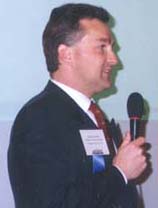 enhanced crops. enhanced crops.
John Bloomer, wheat biotech manager for Anglo-Swedish firm AstraZeneca, acknowledged that progress was slow in gaining European acceptance of GMO products, but said he was optimistic that was changing. AstraZeneca recently had success introducing a biotech tomato puree in Europe and is currently focusing on development of fungal control wheat varieties for European farmers, he said. Last May, AstraZeneca struck an alliance with seed company AgriPro to develop genetically enhanced wheat in North America, he said. Bloomer said numerous recent food scares, a distrust of the government regulatory system and a general unease with large corporations were factors in the European Union’s reluctance to embrace GMO crops. He said the US wheat industry could overcome many of these hurdles by starting early to educate consumers about the benefits of biotech wheat. "Gaining trust takes time, so you’ve got to start early and prepare the way," Bloomer said. "We have the opportunity and the time to do it right in wheat, but it will need cooperation in the whole wheat food chain." 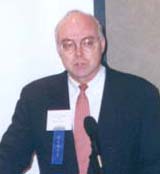 But overcoming the multiple issues associated with biotech crops
will require a lot of collaboration and consultation among all players in the wheat
industry, said Kansas State University Dean of Agriculture Marc Johnson. But overcoming the multiple issues associated with biotech crops
will require a lot of collaboration and consultation among all players in the wheat
industry, said Kansas State University Dean of Agriculture Marc Johnson.
"These aren’t things that we need to fear, they’re issues that we need to address," Johnson said. TOM ROBERTS HONORED This year was the 50th report on hard winter wheat quality. This report was dedicated to Mr. Thomas C. Roberts of Manhattan, Kansas. Mr. Roberts presided over the Wheat 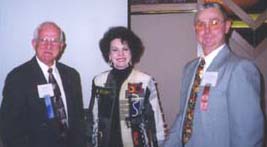 Quality Council and its predecessor organizations from 1966-1992. He
has devoted most of his working career to wheat quality improvement in the hard winter
wheat region. Tom and his wife Dixie were WQC guests at the 2000 meeting and were
recognized at the final luncheon. Quality Council and its predecessor organizations from 1966-1992. He
has devoted most of his working career to wheat quality improvement in the hard winter
wheat region. Tom and his wife Dixie were WQC guests at the 2000 meeting and were
recognized at the final luncheon.
Tom and Dixie Roberts with Ben Handcock, Wheat Quality Council EASTERN SOFT WHEATS There were eight lines of wheat entered in the test this year, along with two check cultivars. A huge battery of tests were run on the samples, including the following: Miag Milling 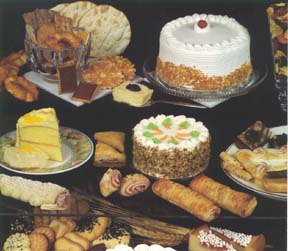 Rapid Visco Analyzer Quadrumat Jr. Milling Test Weight Allis-Chalmers Milling 1000 Kernel Weight Acidulated Flour Viscosity MacMichael Viscosity Damaged Starch Ash Solvent Retention Capacity AWRC Alpha-Amylase Activity Wheat Density Sugar-Snap Cookies Alveograph Wire-Cut Cookies Biscuits Falling Number Chopin Milling Mixograph Moisture Particle Size Protein Content Single Kernel Characterization Quality evaluators were: USDA/ARS Soft Wheat Lab, Star of the West Milling Co., Nabisco Inc., The Mennel Milling Co., Midstate Mills and Siemer Milling. Comments in a summary of the quality testing were:
HARD WINTER WHEATS Eleven advanced lines of hard winter wheat from five states were evaluated this year by the cooperators in the Council. Each was compared to a top quality variety currently grown in the state.
Sample analysis and report preparation cooperators were USDA-ARS-GMPRC-HWWQL, American Institute of Baking, Federal Grain Inspection Service and KSU Department of Grain Science & Industry. Baking cooperators included: ADM Milling Co, AIB, Bay State Milling, Cargill Inc, Cereal Food Processors, ConAgra Inc, KSU, The Long Co, Mennel Milling, Roman Meal Milling, University of NE, Hard Winter Wheat Quality Lab, Hard Spring Wheat Quality Lab and Western Wheat Quality Lab. The baking cooperators scored the flours on sponge characteristics, bake absorption, bake mix time, mixing tolerance, dough characteristics "out of mixer," dough at "make up," crumb grain, crumb texture, crumb color, loaf volume and overall baking quality. The two Colorado lines were rated lower than the check. (Prowers) The two Kansas lines were rated about equal to the check. (Jagger) The two Nebraska lines and the check (Culver) all had some scab damage so the tests really can’t be taken too seriously. The two South Dakota lines were rated lower than the check. (Tandem) Two Oklahoma lines were rated slightly lower than the check (2174) and one line was rated slightly better than the check. Each year the mill chemists give an award to the breeder of the top line evaluated. The award this year went to Oklahoma State University breeder, Brett Carver, for his line OK96717.
Proudly looking on is Paul Jackson (right) representing the Oklahoma Wheat Commission. Carver’s line, OK96717, was rated highest by the mill chemists at the Wheat Quality Council Technical Review Session. The mill chemists take money out of their own pocket and present this award on an annual basis. HARD SPRING & DURUM WHEATS Nine experimental hard spring wheat lines were planted at four locations in North Dakota, South Dakota and Minnesota. All were compared with the variety Grandin, a high quality variety grown in the region. Mother Nature did not treat the crop well this year in our locations. In fact, the durums were completely lost and only one site, Crookston, MN had any spring wheat to test. Minot, ND had hail; Casselton, ND and Brookings, SD samples were discarded due to severe sprout damage. Three of the lines grown at Crookston also had sprout damage and were discarded. Therefore, only six lines from one location, Crookston, were even evaluated. The USDA-ARS-Hard Red Spring and Durum Wheat Quality Laboratory in Fargo, ND milled the
samples and used the following methods of analysis:
The flours were baked and scored by the following cooperators: ADM Milling Co, Bay State Milling, Cargill Inc, Cereal Food Processors, ConAgra Inc, Montana State University, North Dakota State University, The Long Co, USDA-ARS-GMPRC-HWWQL in Manhattan, KS and USDA-ARS-HRS and Durum Lab in Fargo, ND. Scores were based on bake absorption, bake mix time, mixing tolerance, loaf volume, crumb color, crumb grain, crumb texture and an overall baking rating.
The spring wheats will be grown in the same locations in 2000, and the durums will be grown in Minot, ND and Sidney, MT. WQC Board of Trustees The following Board members completed their terms this year: Don Mennel – Mennel Milling Co Ben Handcock, (left) WQC, presents Don Mennel , Mennel Milling Company, with a plaque thanking Don for having served six years on the WQC Board of Trustees. New members elected to the Board include:
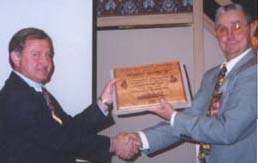
Robert Bennett (left) Farmland Grain, was presented the Full Kernel Award plaque from Ben Handcock, WQC for having served the Council as Chairman for the past year.
WHEAT QUALITY COUNCIL WHEAT TOURS SE Soft Wheat Tour (GA, SC, NC, VA) Start in Albany, GA and end in Richmond, VA. Monday, April 17—Thursday, April 20, 2000. Hard Winter Wheat Tour (KS, NE, CO, OK) Eastern Soft Wheat Tour (AR, MO, IL, TN, KY, IN, OH, MI) Hard Spring & Durum Wheat Tour (ND, SD, MN)
PHONE: 605-224-5187 FAX: 605-224-0517 |
||||||||||||||||||||||||||||
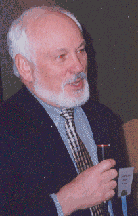
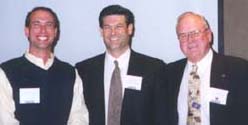
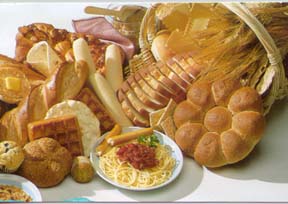
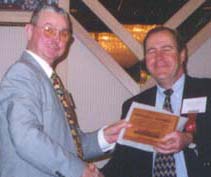
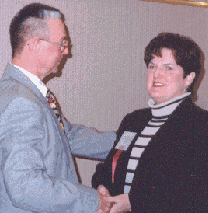 Patricia Berglund of the Northern Crops Institute, Fargo, ND was introduced
as Chairperson for the year 2000
Patricia Berglund of the Northern Crops Institute, Fargo, ND was introduced
as Chairperson for the year 2000